Table of contents
- Can Facebook Messenger be hacked
- How to tell if Facebook Messenger has been hacked
- 1. Unusual Facebook password change notification
- 2. Login issues
- 3. Strange friend requests
- 4. Changes to personal account information
- 5. Suspicious private messages
- How hackers can access your Messenger account
- 1. Phishing
- 2. Malware and spyware
- 3. Weak passwords and data leaks
- 4. Social engineering
- What to do if your Facebook Messenger is hacked
- 1. Change Messenger password
- 2. Report issue to Facebook
- 3. Remove suspicious apps
- 4. Delete suspicious devices
- 5. Enable 2FA
- 6. Scan device for spyware
- Conclusion
Can Facebook Messenger be hacked
Yes, Facebook Messenger can be hacked through stolen logins, hidden apps, or spyware. A hacked Messenger account can also affect your wider Facebook profile.
Messenger does have built-in encryption and Meta’s security layers, but no app is fully immune. If you’ve ever asked, “How secure is Facebook Messenger?” The answer is that its protections help, but cannot guarantee total safety.
How to tell if Facebook Messenger has been hacked
You can know if Facebook Messenger is hacked by watching for odd activity, such as unknown logins, unfamiliar device alerts, or messages you didn’t send.
Let’s break down the most common red flags so you know exactly what to look for.
1. Unusual Facebook password change notification
A common sign of a hacked Messenger account is a Facebook password reset email you didn’t request. A Facebook password reset email usually contains a one-time code or a notice that someone else may be trying to log in.
If you receive this Facebook password reset email without changing your password, another person could be attempting to take control, and you should secure your Facebook account immediately.
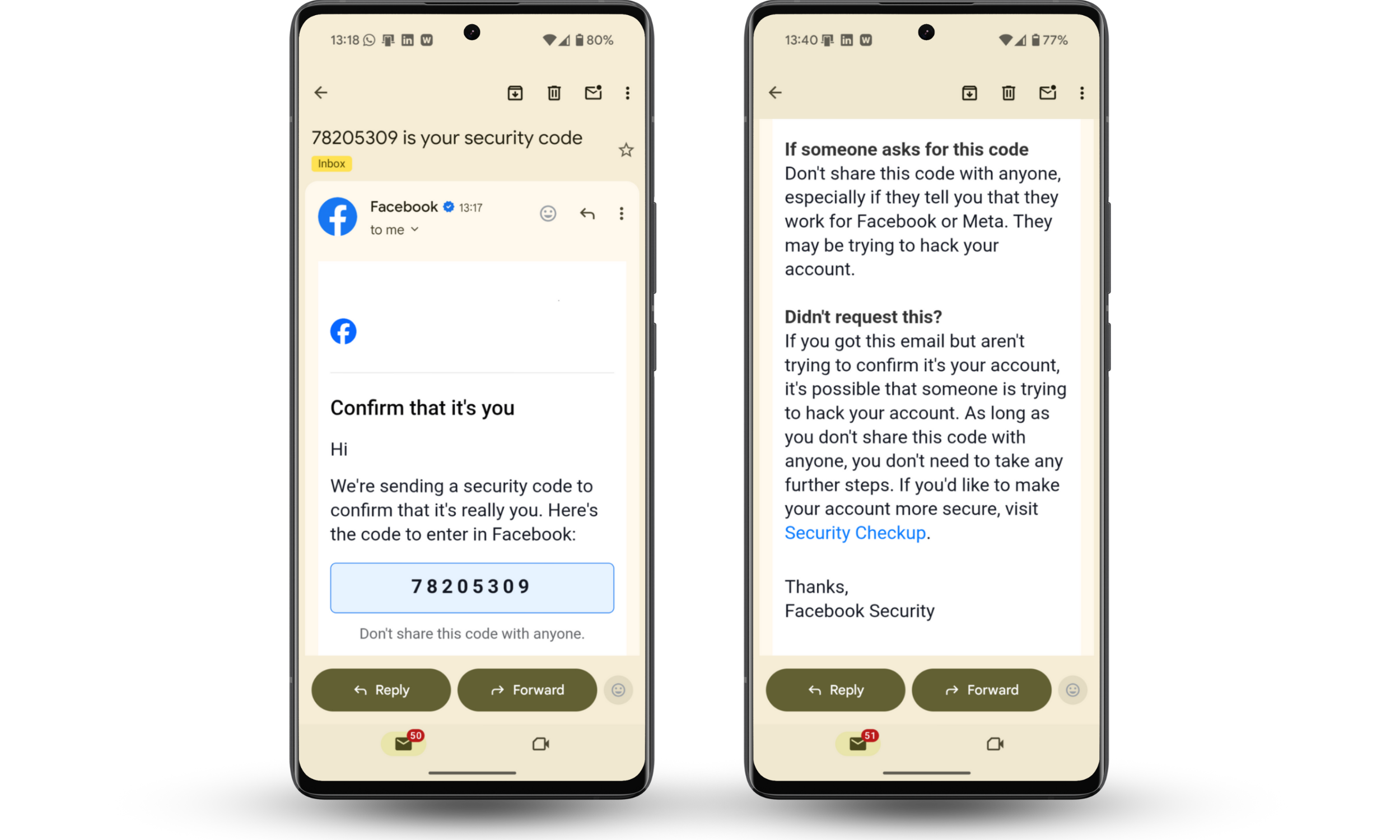
2. Login issues
Unexpected login problems in Facebook Messenger often mean your account has been hacked. If another person signs in to your Facebook account using your password, Facebook may automatically log you out of your active Messenger session.
Another warning sign is spotting unfamiliar devices or locations in your Facebook login history. The Facebook login history records each device, browser, and location that accessed your account, so reviewing it helps confirm unauthorized use.
How to check your Facebook login history:
- Open the Facebook app and tap the menu icon (three horizontal lines).
- Select Settings & privacy, then tap Settings.
- In the Accounts Centre, choose Password and security.
- Under Security checks, tap Where you’re logged in.
- Pick your Facebook account under Where you’re logged in.
- Review the devices, browsers, and locations that have tried to access your Facebook account.
- If you see an unfamiliar device or suspicious location, select the device and tap Log out to remove access.
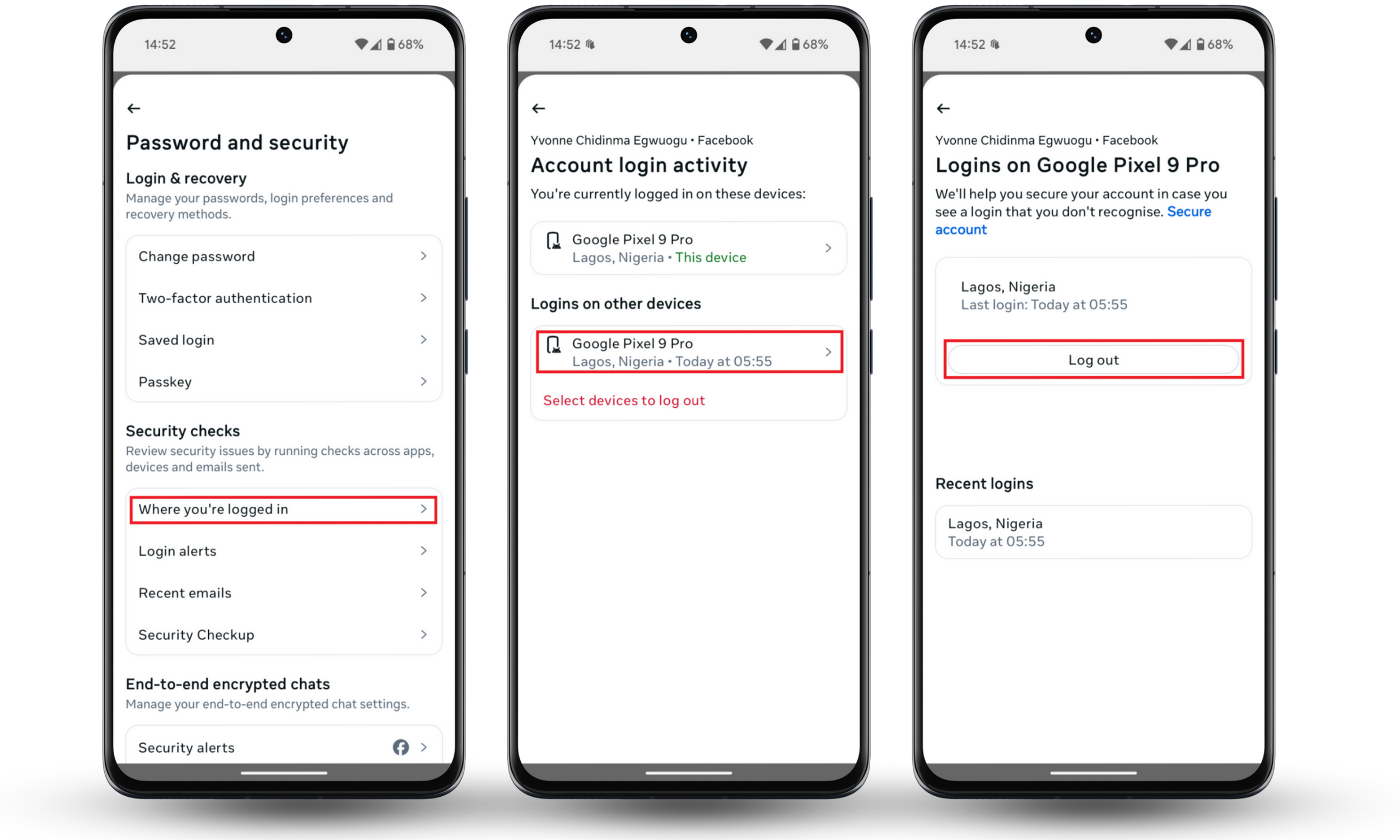
3. Strange friend requests
Hackers may use a hacked Facebook Messenger account to send unusual friend requests or like pages you never followed. Strange page activity and unknown friend requests are a form of social engineering, meant to trick others into trusting the profile.
The Federal Trade Commission (FTC) found that imposter scams, including impersonation through social media—like fake friend requests, accounted for over $1.1 billion in losses in 2023.
When reviewing your account, watch for sudden friend requests to strangers, likes you never made, or invitations to groups that don’t match your activity.
4. Changes to personal account information
Another clear sign of a hack is changes to your personal info on Facebook. Hackers usually tamper with your Facebook profile, email, and phone number to lock you out of your account and thwart any attempts to recover it.
Sometimes, hackers add an extra phone number to your Facebook settings or a recovery email you don’t recognize. Spotting strange details like these is a strong clue that someone else has control. The safest move is to reset the password and remove the contact details you don't know.
5. Suspicious private messages
One of the easiest ways to spot a hacked Facebook Messenger account is by looking at your conversations. If you notice messages you never typed—especially ones filled with random links or file attachments—it usually means someone else has control of your Messenger account. Friends may even ask why you sent them something strange. When private messages in your Facebook Messenger chat history don’t match your activity, take it as a serious warning and secure the account right away.
How hackers can access your Messenger account
Hackers can access a Facebook Messenger account through phishing attacks, leaked account data, hidden malware on devices, or nasty social engineering tricks.
According to the FBI’s Internet Crime Report, phishing, spoofing, and personal data breaches were the most reported cybercrimes in 2024. So, if you want to understand more about how Facebook accounts get hacked, looking at these methods is a good place to start.
Because these hacking methods are often combined, it is easy for a Facebook user to miss the warning signs. The following sections explain each technique in detail so you know exactly what to watch for.
1. Phishing
Phishing is one of the easiest ways hackers steal access to a Facebook Messenger account. A phishing attack happens when a hacker sends a fake email or creates a cloned Facebook login page that looks like the real Facebook website. A phishing attempt aims to trick you into typing a password or security code where the hacker can capture it.
What to watch for in a phishing attempt:
- An email or message that pressures you to act fast, like “reset your Facebook password now.”
- A login page with a web address that is close to, but not actually, facebook.com.
- A request for personal details or codes that Facebook never asks you to share in a message.
Notice any of these signs in a link or email? If so, just close the site or message and log in only through the official Facebook app or website.
2. Malware and spyware
Malware on a phone can record every keystroke a Facebook user types, including the password to their Messenger account. Spyware is even more invasive because it can track activity, copy conversations, and forward private information without the owner noticing. Hackers use the stolen details to log in to your Facebook account and take control.
Some spyware even tracks the content of private Messenger chats, letting outsiders read conversations in real time.
Signs your device may carry malware or spyware:
- Your phone feels unusually slow or overheats for no reason.
- Unknown apps appear on your device.
- Your data usage increases, even when you are not actively online.
3. Weak passwords and data leaks
Someone can spy on your Facebook Messenger through weak or reused passwords. Hackers can run programs that guess thousands of password combinations until one works, and simple logins are usually the easiest to crack. Reusing the same password across sites is just as dangerous. Cloudflare reported in 2025 that 41% of successful logins involved credentials already exposed in breaches.
When one site leaks your reused password, the same password might unlock your Facebook account. The only reliable fix is to use strong, unique passwords.
But strong passwords get leaked in breaches, too. Many people never realize their information is circulating online until a hacker takes advantage of it.
Clario Anti Spy’s Data breach monitor solves this issue by scanning your email against known breach databases and alerting you if your credentials have leaked. That way, you can change the passwords in the affected accounts before any damage is done.
Follow these steps to check your email with Data breach monitor:
- Download Clario Anti Spy and create an account.
- Select the Data breach monitor from the dashboard.
- Enter the email address you want to check.
- Tap Scan to start checking against known breach databases.
- Review the results to see if your information appears in any breaches.
- Follow the recommendations to secure any compromised accounts.
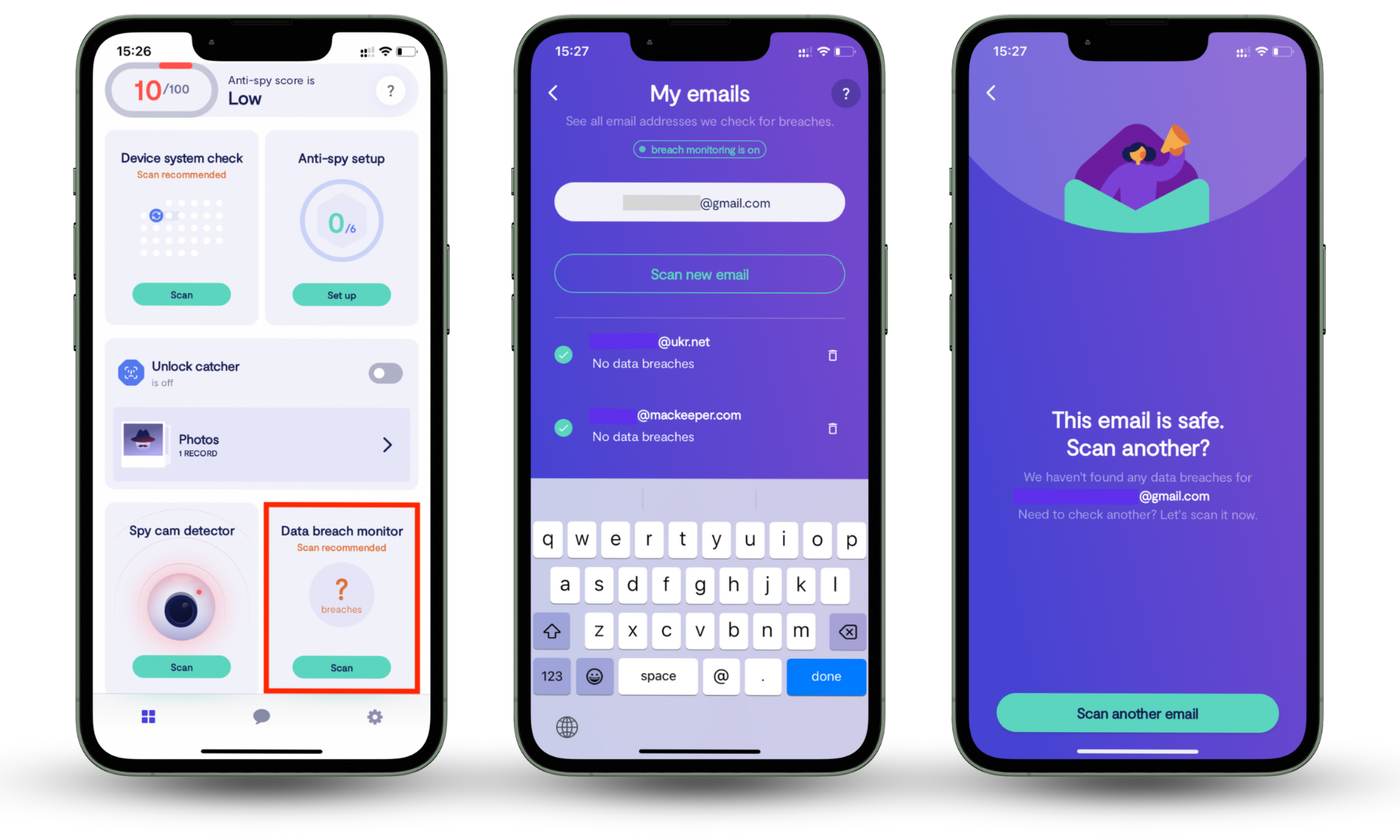
4. Social engineering
You can get hacked on Facebook or Messenger through social engineering.
Social engineering is different from phishing. Phishing relies on fake websites or emails to steal logins, but social engineering depends on conversation and trust. Instead of sending a link, an attacker talks their way into a Messenger account by posing as a friend or support agent. They might send a direct message saying your account has a problem, then ask for a code or personal detail to “fix” it. Once that code is shared, the attacker signs in and locks you out of your Facebook account.
Social engineering can also take more subtle forms. Hackers sometimes post viral question threads on social media—like “What was your first pet’s name?” or “What street did you grow up on?” These questions often mirror common security prompts; people give away answers without realizing it.
In other cases, attackers build fake profiles that interact over time, gradually earning trust before asking for sensitive details.
When a request seems unusual or out of place, it’s best to pause and verify before replying.
What to do if your Facebook Messenger is hacked
If a Facebook Messenger account has been hacked, the fastest recovery starts with resetting the password and regaining control of the login. From there, review account details, remove suspicious apps or devices, and run a full security scan on your phone.
These steps mirror what to do if your Facebook gets hacked, since Messenger and Facebook accounts share the same login.
In the next sections, I’ll explain step by step the exact actions you should take to recover your account and keep control over your messages.
1. Change Messenger password
The fastest way to stop a hacker is by changing the password on your Facebook account, which also secures Messenger. Acting quickly locks out anyone trying to use the stolen login.
How to change your Facebook password:
- Open the Facebook app and tap the hamburger menu (three horizontal lines).
- Select Settings & Privacy, then tap Settings.
- In the Accounts Centre, choose Password and security.
- Tap Change password.
- Enter your current password and create a new one.
- Save changes to update your login.
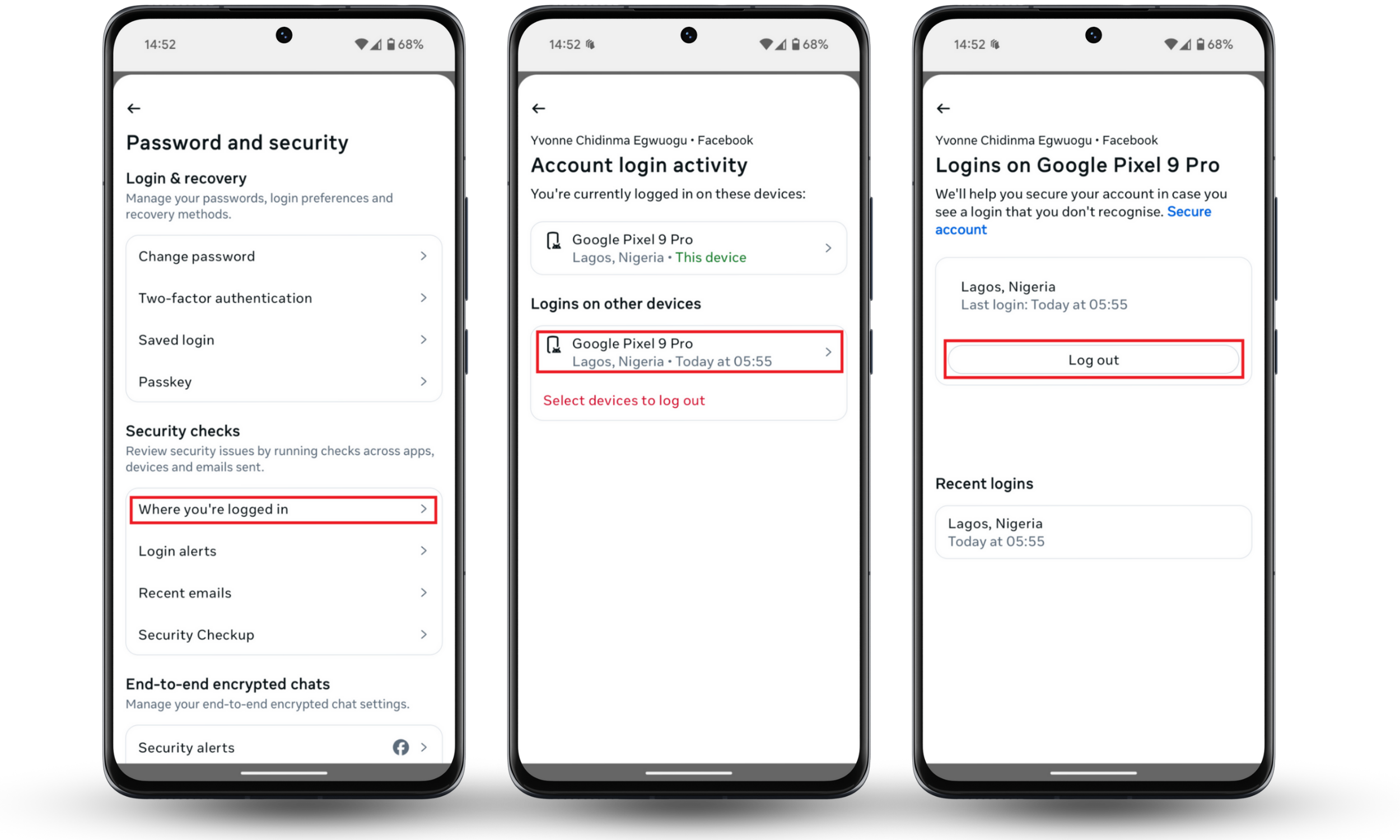
Pick a strong password that’s at least 12 characters long and mixes upper- and lowercase letters, numbers, and symbols. Avoid using names, birthdays, or common words. For example: Orange$unset!94 is much harder to crack than sunset1994.
2. Report issue to Facebook
After changing your password, the next step is to alert Facebook so the hack can be reviewed and blocked. Reporting helps stop the attacker from misusing your Messenger account further.
How to report a hacked Facebook account:
- Go to www.facebook.com/hacked in your Android or iOS browser.
- On the What to do if your account has been hacked page, click Next.
- Enter your login details.
- Follow the on-screen prompts to review recent activity and secure the account.
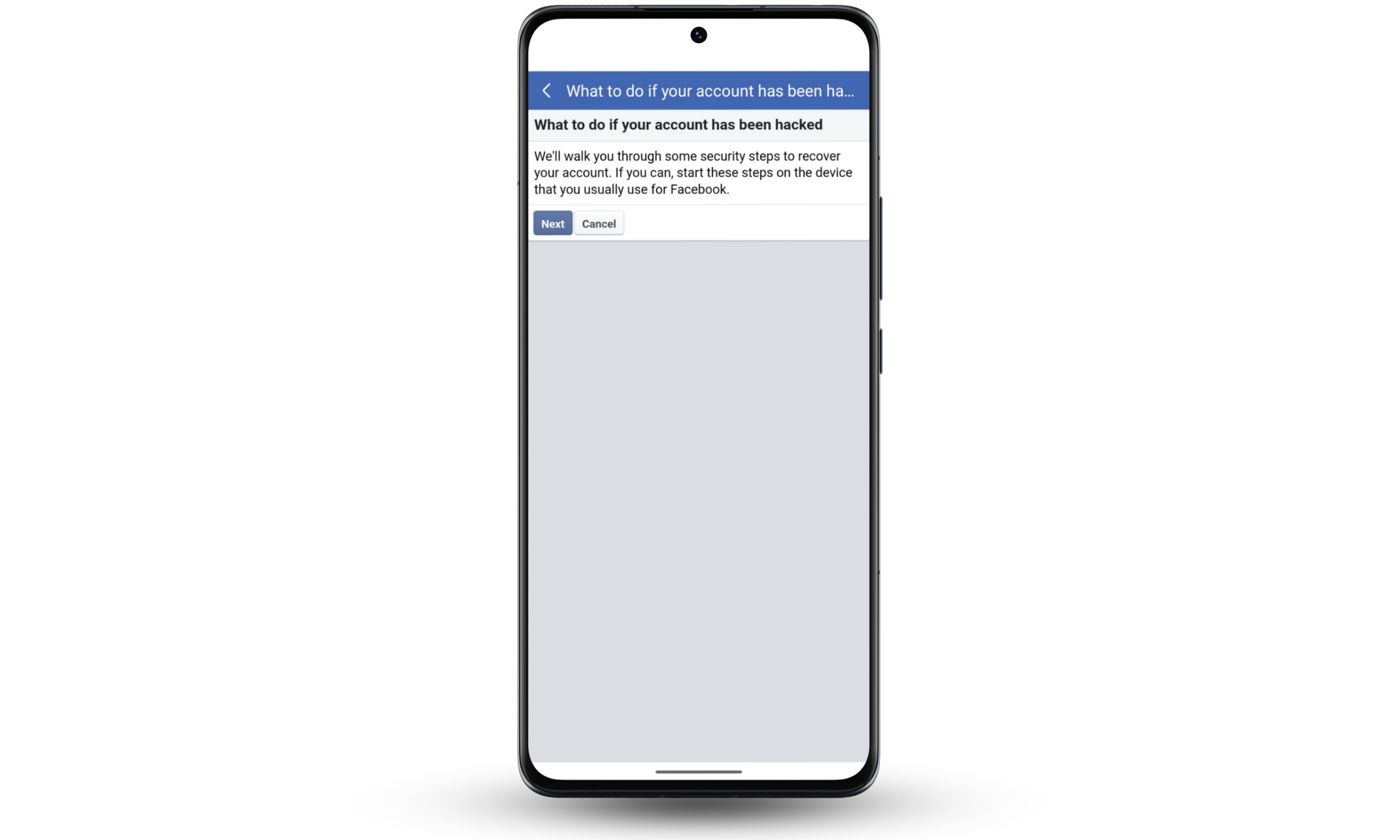
3. Remove suspicious apps
Hackers sometimes connect shady apps to your Facebook account so they can stay inside even after you change the password. Those apps may read your profile, grab contacts, or even send messages through Messenger without you knowing. Many look harmless, like games or quizzes, but they’re really a way to steal data.
How to remove suspicious apps from Facebook:
- Open the Facebook app and tap the hamburger menu.
- Go to Settings & Privacy, then tap Settings.
- Scroll to Your activity and select Apps and Websites.
- Check the list of connected apps.
- Delete anything you don’t recognize or no longer use.
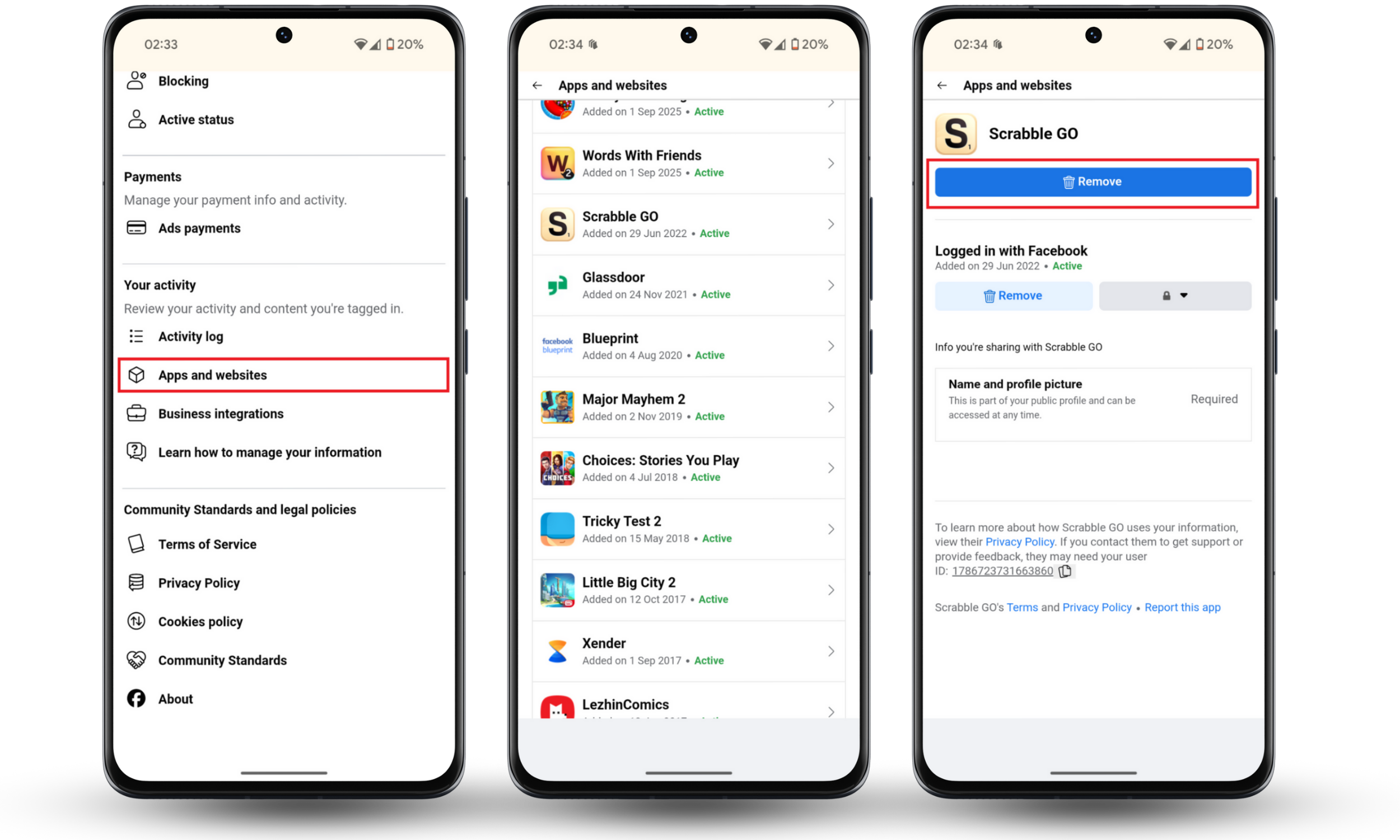
4. Delete suspicious devices
If your Facebook Messenger account was hacked, the intruder may still be logged in on another phone or computer. Logging out of suspicious devices immediately cuts them off.
Follow these steps to log out of devices on Facebook:
- Open the Facebook app and tap the menu icon (three horizontal lines).
- Select Settings & privacy, then tap Settings.
- In the Accounts Centre, choose Password and security.
- Under Security checks, tap Where you’re logged in.
- Pick your Facebook account under Where you’re logged in.
- Review the devices, browsers, and locations that have tried to access your Facebook account.
- If you see an unfamiliar device or suspicious location, select the device and tap Log out to remove access.
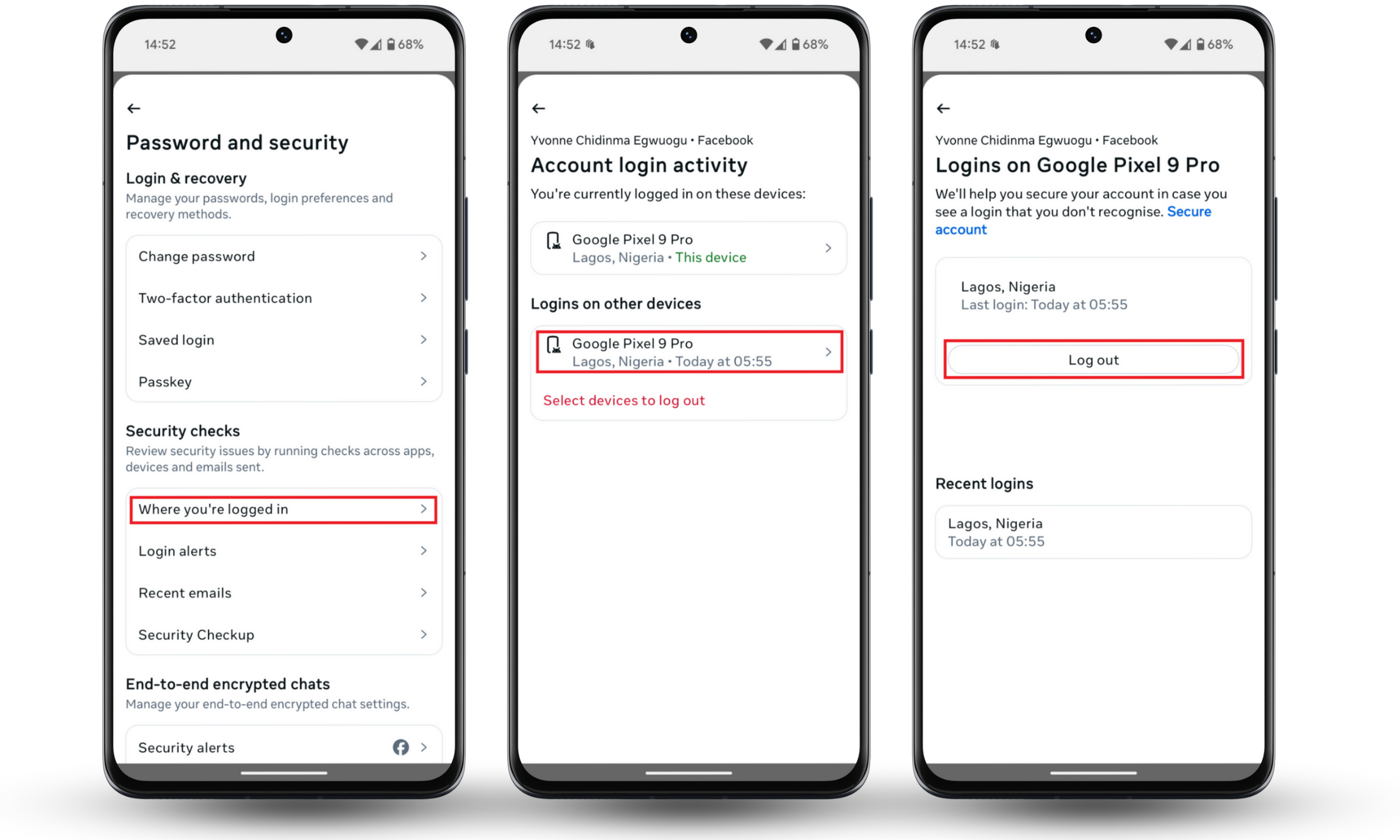
5. Enable 2FA
Two-factor authentication (2FA) adds a second layer of security to an FB account. Even with your password, a hacker can’t get into Messenger without also entering a special code.
Follow these steps to turn on 2FA on your Facebook account:
- In the Accounts Centre, select Password and security.
- Tap Two-factor authentication.
- Choose the Facebook account you want to protect.
- Enter your current Facebook password.
- Facebook will send a security code to your registered email—enter the code.
- Select your 2FA method: authenticator app, SMS/WhatsApp, or security key.
- Follow the on-screen prompts to finish setup.
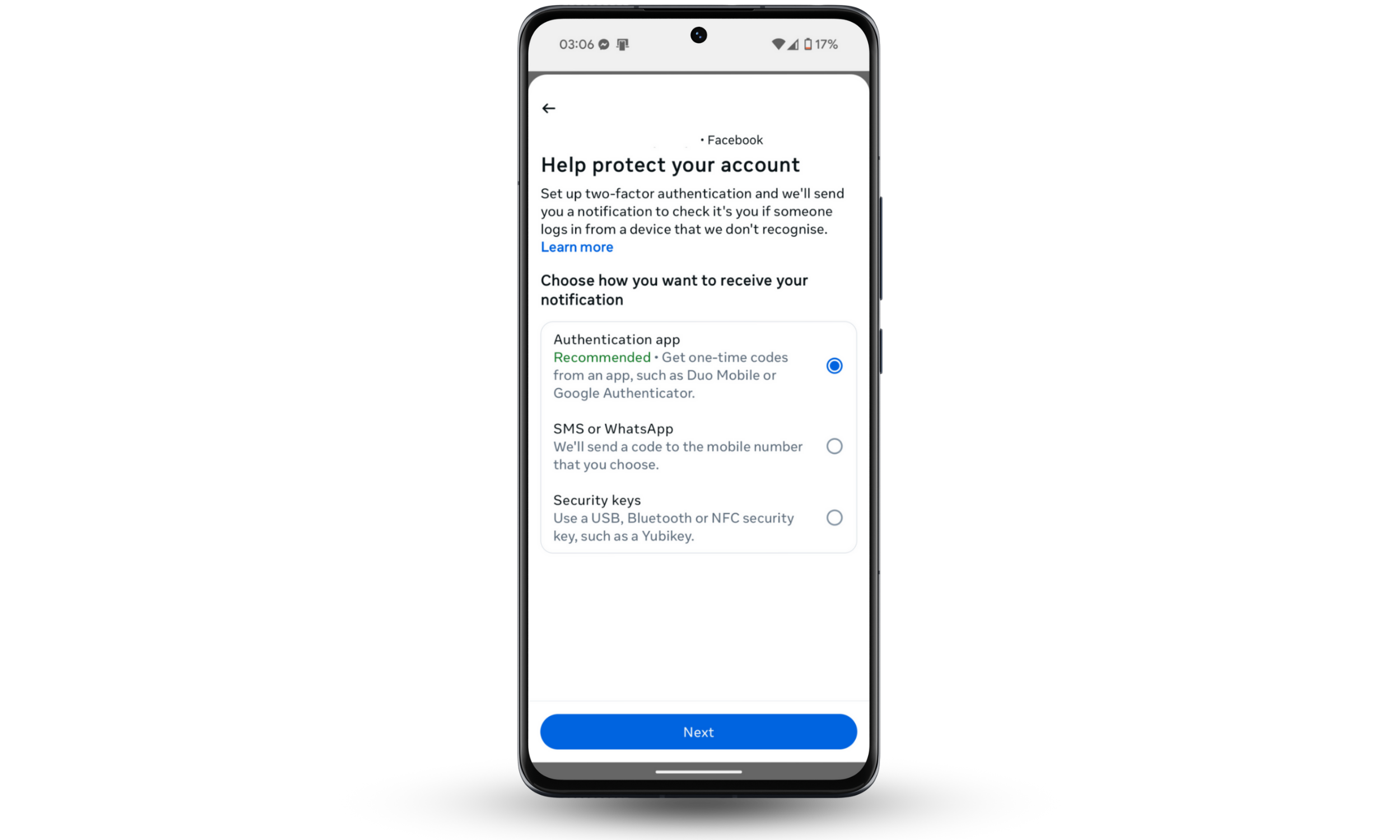
Using an authenticator app or a security key is more secure than SMS, but any method gives stronger protection than a password alone.
6. Scan device for spyware
Sometimes, a hacked FB Messenger account is traced back to spyware on the phone. Spyware can watch what you type, track your activity, and even copy private chats. That means the attacker keeps slipping back in, no matter how many times the password is changed.
Clario Anti Spy helps by running a full spyware scan. Clario Anti Spy’s Spyware Scan checks your phone for hidden monitoring apps and flags anything suspicious. Once the scan finishes, it guides you through removing the threats so attackers can’t use them again.
Here’s how to run a Spyware Scan in Clario Anti Spy:
- Download Clario Anti Spy and create an account.
- Tap Spyware Scan on the dashboard.
- Tap Scan to begin.
- Review the results and remove any suspicious apps.
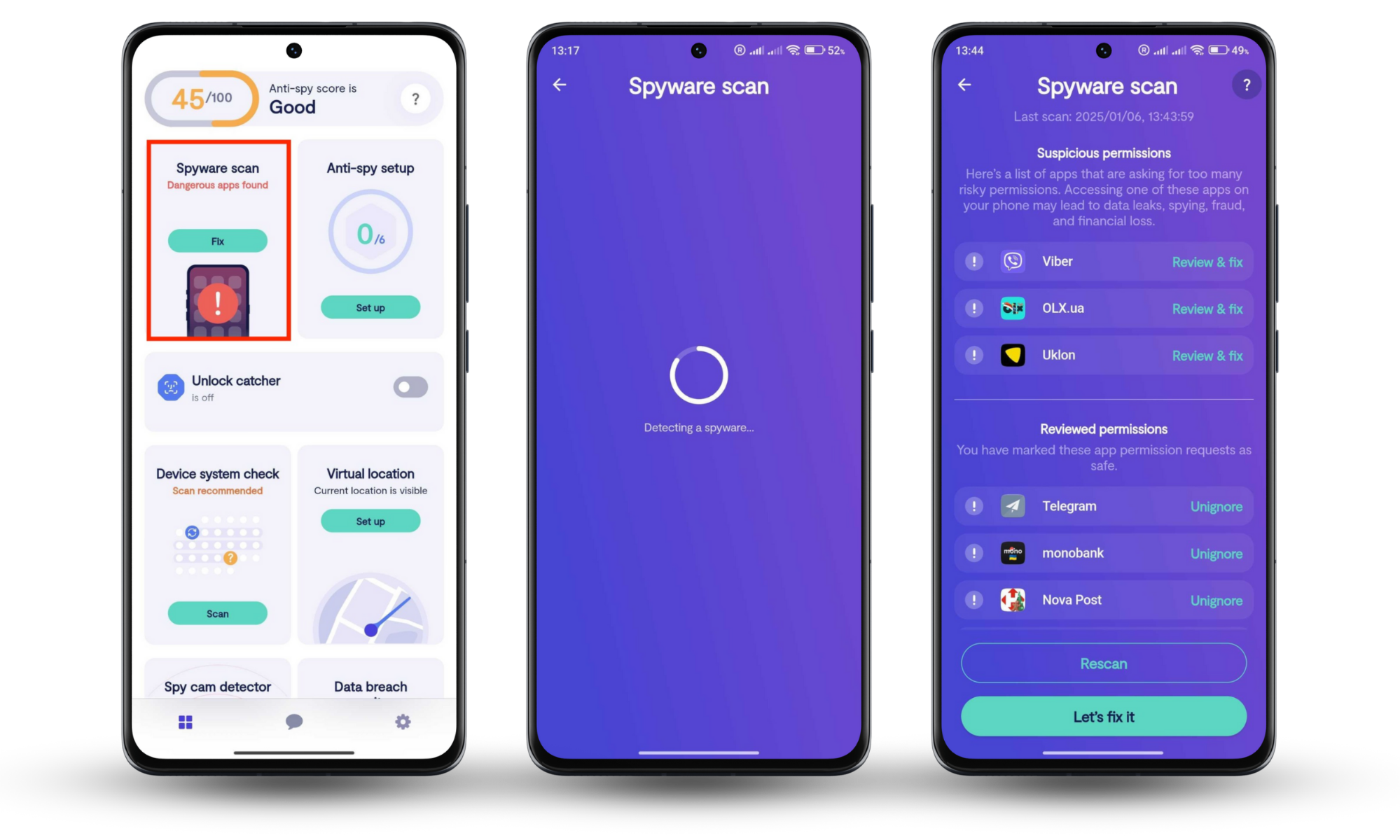
Conclusion
Getting hacked on Facebook Messenger is frustrating, but you are not helpless. After you recover your account, you still need to add extra layers of protection. Clario Anti Spy helps by scanning for spyware and warning you if your login details appear in a data breach. Download Clario Anti Spy today and keep your Messenger secure.


